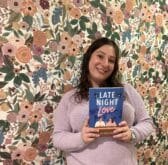
Last week, popular romance audiobook narrator Zachary Webber shared a video to his Instagram account in which he said that Zionists should commit suicide.
This was the latest of many incredibly antisemitic posts by this individual since Oct. 7, which included denying that Hamas committed rape and spreading allegations of blood libel. But many authors who have worked with Webber only spoke out after he crossed the line of suggesting self-harm.
As a Jewish woman who is outspoken about suicide prevention and has struggled with self-harm, I was horrified. When I saw two posts by authors condemning this language, I felt slightly better, even though neither post explicitly mentioned Jews or antisemitism.
Author Sierra Simone apologized for promoting his work writing, “We can call for change and peace without wishing harm, and we can keep our eyes and hearts open to each other while we work for justice.” Romance author Chloe Liese commended Simone, adding that she fired Webber from her upcoming project.


However, both authors posted updated statements clarifying these apologies. One said that her original post “was not a call to empathize with supporters of genocide.” The other wrote, “I do not support genocide.” It is unclear whether the authors have ended their working relationships with Webber.
Once again, neither statement mentioned the community the audiobook narrator’s statements harmed: Jews. Instead, both statements bought into the antisemitic lie that all Zionists are pro-violence, pro-genocide, and racist villains.
Antisemitism under the mask of anti-Zionism
Antisemites like to claim that anti-Zionism is not antisemitism because not all Jews are Zionists, which is true. But most are. According to a 2020 Pew survey of Jewish Americans, 80% reported that caring about Israel is an essential or important part of their Jewish identity. Emphasizing the distinction between Zionists and Jews when the vast majority of Jewish people are Zionists often manufactures a twisted “Good Jew, Bad Jew” litmus test.

If we replace this audiobook narrator’s statements with the percentage of Jews who consider themselves Zionists, this is a call for the elimination of most of our population. His suggestion that 80% of Jews should die was made without consequence — simply because he said “Zionists” instead of “Jews.”
Jews are a minority, and yet unlike any other minorities, we are told that our pain does not matter. In a post shared by author Zibby Owens describing what today’s antisemitism looks like, another author commented, “Man, if Palestinians weren’t being ethnically cleansed this would be really beautiful.” This response that delegitimizes Jewish suffering for the murder of six Israeli hostages and the deep mourning the Jewish people have experienced since Oct. 7, isn’t just callous and unfeeling; it’s antisemitic. But this kind of antisemitism is masked under the guise of advocating for Palestinians, buying into a twisted binary in which the only way to support the Palestinian people is through the destruction of the Jewish State of Israel.
Telling Zionists to kill themselves does nothing to help Palestinians. It only reminds us of a lesson our people have learned time and time again throughout history — Jews do not count.
How the Jewish books world has reacted to Zachary Webber’s antisemitism
Many Jewish book influencers took to their pages to condemn a lack of safety in the literary world for Jewish fans, and the culture of complicity toward antisemitism. While popular audio erotica app Quinn removed Webber’s recordings over his call for violence, none of the authors or publishers who worked with Webber have condemned his antisemitism.

Sasha, who runs the Instagram account @toobusyreadin, which often focuses on books written by Jewish authors and those with Jewish characters, wrote that she has been appalled by the lack of out toward antisemitism.
If any other group was told to die or repeatedly harassed, there would be immediate backlash, she argued in a post showing the cover of Dara Horn’s “People Love Dead Jews.”
“A prominent audiobook narrator thought it would be appropriate to tell a group of people to take their own lives. In any other circumstance, I have little doubt that this information would be enough for us to collectively condemn this rhetoric, but apparently that is not the case and people have drawn the line at Jews.
“If you have to include a caveat that in any way justifies what this man said, you are a xenophobic antisemite, full stop. Because I guarantee that if you were to substitute any other group of people, there would be nothing but outrage,” she continued. “Speaking out and condemning Zachary Webber’s words does not somehow negate the damage and destruction happening across the Middle East, but it sure as shit does not move the needle forward or save lives in any way. Hate begets hate.”
Sasha told Unpacked that she has seen those in the publishing and writing world ignore antisemitism and allow it to flourish under the appearance of activism. She wondered why Jewish criticism of these actions was never taken into account.
“The double standards for the Jewish community in the literary world have been heartbreaking. Never have I seen so many people remain silent or agree with the side of oppression under the guise of activism. I just want to know why our voices aren’t worth listening to,” she said.
Zoe, of @Zoereadss on Instagram, called out this lack of accountability toward antisemitism in a post on her account.
“What if someone had acted on what ZW said? If his inciteful, hateful rhetoric caused someone (likely a Jewish person) to seriously harm themselves, or worse. Would you hold him responsible then?”

Eytan K, @sleepylibrarian on Instagram, shared his thoughts in a post showing the cover of Noa Tishby and Emmanuel Acho’s “Uncomfortable Conversations with a Jew.”
“What other group is silenced when they bring up how harmful someone is and what they say is a type of hatred? What other group gets told that when someone says they should kill themselves that they should be looking at the context of the statement,” he said.
Some book Instagrammers expressed their exhaustion toward the current environment of complacency of antisemitism.

Gillian, who runs @bookishly_vintage on Instagram, blasted those who have tried to justify Webber’s statements and gave steps for her followers on how to support their Jewish friends during this time.
“I’m tired of people contextualizing someone saying that my people and I don’t deserve to live.
“I’m tired of antisemites being praised and supported, despite calling for the 💀 of Jews.
I’m tired of Bookstagram standing up for every marginalized community… except one,” she wrote.
Antisemitism in the literary community
I recently wrote about finding the Jewish romance community after Oct. 7. In a global trend, Jewish authors and Bookstagrammers have lost promotional opportunities and tour dates, been review-bombed, and in many cases, blacklisted. Amid the spike in antisemitism, I asked the book community to share their experiences with antisemitism since then.
Many described feelings of isolation since Oct. 7 with much of the Bookstagram and publishing community often alienating Jews, and a lack of urgency in dealing with antisemitism.

Israeli romance author Michelle Mars had her appearance at the Steamy Lit Convention canceled after being deemed “anti-Palestinian.” The con claimed that Mars violated its DEI policy but refused to specify how she did that besides openly sharing Zionist beliefs. Other authors who violated this policy were not removed from the convention’s lineup.
“It was already hard realizing that a conference that claims to champion diversity would have a double standard that excluded me, but not others, despite belonging to one of the smallest minority groups,” Mars said.
Best-selling romance author Danielle Pearl agreed that many spaces that have championed diversity, don’t call out antisemitism when it arises, instead letting it fester in many activist spaces under the guise of pro-Palestinian advocacy.
“The bar for speaking out against antisemitism should be much higher, as it would be for any other minority group,” Pearl said. “If you can’t support Palestinians without throwing the world’s most historically persecuted minority group under the bus, you’re doing your activism wrong, and the romance community is no place for it.”

Recently, the Albany Book Festival had to cancel its feminist panel on girls’ coming-of-age novels. Two panelists, Lisa Ko and Aisha Gawad, refused to be interviewed by author Elisa Albert because she is a “Zionist.” Owens discusses in her introduction to “On Being Jewish Today” that numerous guests on her podcast decided they no longer wanted to be featured after she spoke out about Israel.
For author Evelyn Silver, whose work includes queer, Jewish paranormal romances, she’s found that since the Israel-Hamas war began, her identities have been at odds with one another.
“Many queer writing and bookish communities are betraying their Jewish members by telling us to either root for our own destruction or leave,” she said.
Many authors and influencers reported being excommunicated by their bookish communities and forced to disavow a major part of their Jewish identity for friendship. Others cited losing friends over conspiracy theories or calling out antisemitic dog whistles. Overall, there’s been a prevalent feeling that Jewish voices are being forcefully ignored and actively targeted.
Authors, publishers, agents, Instagrammers, and readers must listen to Jewish voices. Hear us when we tell you that your explicit actions of “anti-Zionism” are hurting us. Ask yourself why you treat us differently than every other minority and remain silent toward Jew hatred.
And remember that you don’t get to define whether your words and activism is antisemitic. We do. We are tired of being told that our pain and suffering do not matter.
Originally Published Oct 6, 2024 11:42AM EDT
